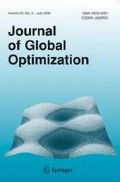Abstract
The tensor complementarity problem is a special instance of nonlinear complementarity problems, which has many applications. How to solve the tensor complementarity problem, via analyzing the structure of the related tensor, is one of very important research issues. In this paper, we propose a mixed integer programming approach for solving the tensor complementarity problem. We reformulate the tensor complementarity problem as an equivalent mixed integer feasibility problem. Based on the reformulation, some conditions for the solution existence and some solution properties of the tensor complementarity problem are given. We also prove that the tensor complementarity problem, corresponding to a positive definite diagonal tensor, has a unique solution. Finally, numerical results are reported to indicate the efficiency of the proposed algorithm.
Similar content being viewed by others
References
Bai, X., Huang, Z., Wang, Y.: Global uniqueness and solvability for tensor complementarity problems. J. Optim. Theory Appl. 170, 72–84 (2016)
Chang, K.C., Pearson, K., Zhang, T.: Perron–Frobenius theorem for nonnegative tensors. Commun. Math. Sci. 6, 507–520 (2008)
Che, M., Qi, L., Wei, Y.: Positive definite tensors to nonlinear complementarity problems. J. Optim. Theory Appl. 168, 475–487 (2016)
Cottle, R.W., Pang, J.S., Stone, R.E.: The Linear Complementarity Problem. Academic Press, New York (1992)
Ding, W., Luo, Z., Qi, L.: P-Tensors, \(\text{ P }_0\)-Tensors, and tensor complementarity problem. Linear Algebra Appl. 555, 336–354 (2018)
Facchinei, F., Pang, J.S.: Finite-Dimensional Variational Inequalities and Complementarity Problems. Springer, New York (2003)
Gowda, M.S., Luo, Z., Qi, L., Xiu, N.: Z-tensors and complementarity problems, arXiv: 1510.07933v2 (2016)
Huang, Z., Suo, S., Wang, J.: On Q-tensors, arXiv: 1509.03088, (2015)
Huang, Z., Qi, L.: Formulating an \(n\)-person noncooperative game as a tensor complementarity problem. Comput. Optim. Appl. 66, 557–576 (2017)
Lim, L.-H.: Singular values and eigenvalues of tensors: a variational approach. In: Proceedings of the IEEE International Workshop on Computational Advances in Multi-Sensor Addaptive Processing (CAMSAP’05), Vol. 1, pp. 129–132. IEEE Computer Society Press, Piscataway, NJ (2005)
Ling, C., He, H., Qi, L.: On the cone eigenvalue complementarity problem for higher-order tensors. Comput. Optim. Appl. 63, 143–168 (2016)
Liu, D., Li, W., Vong, S.W.: Tensor complementarity problems: the GUS-property and algorithm. Linear Multi Algebra 66, 1726–1749 (2018)
Luo, Z., Qi, L., Xiu, N.: The sparsest solutions to Z-tensor complementarity problems. Optim. Lett 11, 471–482 (2017)
Pardalos, P.M., Rosen, J.B.: Global optimization approach to the linear complementarity problem. SIAM J. Sci. Stat. Comput. 9, 341–353 (1988)
Pardalos, P.M.: Linear complementarity problems solvable by integer programming. Optimization 19, 467–474 (1988)
Qi, L.: Eigenvalues of a real supersymmetric tensor. J. Symb. Comput. 40, 1302–1324 (2005)
Qi, L., Chen, H., Chen, Y.: Tensor Eigenvalues and Their Applications. Springer, Singapore (2018)
Qi, L., Luo, Z.: Tensor Analysis: Spectral Theory and Special Tensors. SIAM, Philadelpia (2017)
Song, Y., Qi, L.: Properties of tensor complementarity problem and some classes of structured tensors. Ann. Appl. Math. 33, 308–323 (2017)
Song, Y., Yu, G.: Properties of solution set of tensor complementarity problem. J. Optim. Theory Appl. 170, 85–96 (2016)
Song, Y., Qi, L.: Strictly semi-positive tensors and the boundedness of tensor complementarity problems. Optim. Lett. 11, 1407–1426 (2017)
Song, Y., Qi, L.: Tensor complementarity problem and semi-positive tensors. J. Optim. Theory Appl. 169, 1069–1078 (2016)
Song, Y., Qi, L.: Properties of some classes of structured tensors. J. Optim. Theory Appl. 165, 854–873 (2015)
Wang, Y., Huang, Z., Bai, X.: Exceptionally regular tensors and tensor complementarity problems. Optim. Methods Softw. 31, 815–828 (2016)
Xie, S., Li, D., Xu, H.: An iterative method for finding the least solution to the tensor complementarity problem. J. Optim. Theory Appl. 175, 119–136 (2017)
Yu, W., Ling, C., He, H.: On the properties of tensor complementarity problems, arXiv:1608.01735v3 (2018)
Acknowledgements
The authors would like to thank the editor and the anonymous referees for their helpful constructive comments and suggestions which lead to a significantly improved version of the paper.
Author information
Authors and Affiliations
Corresponding author
Additional information
Publisher's Note
Springer Nature remains neutral with regard to jurisdictional claims in published maps and institutional affiliations.
This work was supported by the National Nature Science Foundation of China (Grant Nos. 11671220, 11771244) and the Nature Science Foundation of Shandong Province (ZR2016AM29).
Rights and permissions
About this article
Cite this article
Du, S., Zhang, L. A mixed integer programming approach to the tensor complementarity problem. J Glob Optim 73, 789–800 (2019). https://doi.org/10.1007/s10898-018-00731-4
Received:
Accepted:
Published:
Issue Date:
DOI: https://doi.org/10.1007/s10898-018-00731-4


